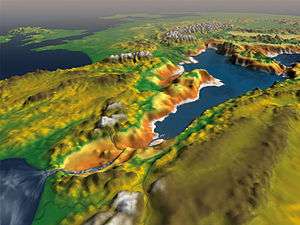Zanclean flood



The Zanclean flood or Zanclean Deluge is a flood theorized to have refilled the Mediterranean Sea 5.33 million years ago.[1] This flooding ended the Messinian salinity crisis and marks the beginning of the Zanclean age. The term was coined by Maria Bianca Cita in 1972 during the Deep Sea Drilling Project study that investigated the transition between the Messinian and Zanclean ages in the Mediterranean.[2]
According to this model, water from the Atlantic Ocean refilled the cut-off inland seas through the modern-day Strait of Gibraltar. The Mediterranean Basin flooded mostly during a period estimated to have been between several months and two years.[3][4] Sea level rise in the basin may have reached rates at times greater than ten metres per day.[3] Based on the erosion features preserved until modern times under the Pliocene sediment, these authors estimate that water rushed down a drop of more than 1 kilometre (0.62 mi) with a discharge of up to 1×108 m3/s (3.5×109 cu ft/s), about 500 times that of the present day Amazon River. Studies of the underground structures at the Gibraltar Strait show that the flooding channel descended in a rather gradual way toward the bottom of the basin rather than forming a steep waterfall.
Not all scientific studies have agreed with the catastrophistic interpretation of this event. Some researchers have estimated that the reinstallment of a "normal" Mediterranean Sea basin following the Messinian "Lago Mare" episode took place in a much more gradual way, taking as long as 10,000 years.[5]
See also
References
- ↑ Blanc, P.-L. (2002). "The opening of the Plio-Quaternary Gibraltar Strait: assessing the size of a cataclysm". Geodinamica Acta (15): 303–317. doi:10.1016/S0985-3111(02)01095-1.
- ↑ Nesteroff, Wladimir D.; William B.F. Ryan; Kenneth J. Hsu; Guy Pautot; Forese C. Wezel; Jennifer M. Lort; Maria B. Cita; Wolf Maync; Herbert Stradner; Paulian Dumitrica (1972). "Evolution de la sédimentation pendant le Néogène en Méditerranée d'après les Forages JOIDES-DSDP". University of Milan Institute of Geology and Paleontology Publication (in French) (125): 47–62.
- 1 2 Garcia-Castellanos, D., Estrada, F., Jiménez-Munt, I., Gorini, C., Fernàndez, M., Vergés, J., De Vicente, R. (10 December 2009) Catastrophic flood of the Mediterranean after the Messinian salinity crisis, Nature 462, pp. 778–781, doi:10.1038/nature08555
- ↑ M. Roveri et al. (2008). "A high-resolution stratigraphic framework for the latest Messinian events in the Mediterranean area" (PDF). Stratigraphy. 5 (3–4): 323–342. Archived from the original on 21 January 2012.
- ↑ Gill, Victoria (9 December 2009). "Ancient Mediterranean flood mystery solved". BBC News. Retrieved 5 May 2013.
External links
-
 Media related to Messinian salinity crisis at Wikimedia Commons
Media related to Messinian salinity crisis at Wikimedia Commons - "Dramatic flood filled Mediterranean Sea". Agence France-Presse. 10 December 2009. Retrieved 2 December 2010.
